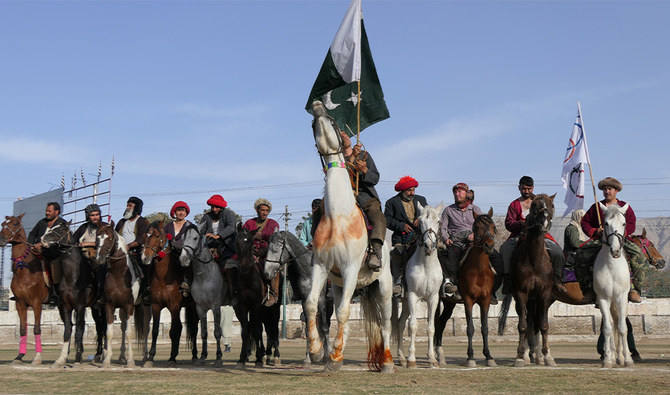QUETTA: Hundreds of fans showed up at a hockey ground in the southwestern city of Quetta this week to watch a game of buzkashi, Afghanistan’s national sport — a test of horse-riding skills and warrior spirit imported to Pakistan by refugees from the neighboring country over four decades ago.
Buzkashi, which translates roughly as “goat pulling,” has been played for centuries across Central Asia, handed down from the time of Genghis Khan, the founder of the Mongol Empire, in the 13th century.
The live body of a defeated enemy was used as the ball in the game’s original version, historians say, but today, two teams win points by throwing a headless goat or calf carcass to a scoring area. The animal is slaughtered the previous night and filled with sand, sewn up, and soaked in water to make it heavy.
So popular is the game in Afghanistan that it lived on amid foreign invasions, civil wars, militant attacks, and today, the resumption of Taliban rule, with thousands of Afghans always showing up to cheer on their favorite riders.

A Buzkashi player on his white horse at Quetta’s Hockey Ground on March 11, 2021. (AN Photo)
In Pakistan’s Balochistan province, which shares a border with Afghanistan and is home to close to 800,000 Afghan refugees, buzkashi has always been a crowd puller. In the spring season, games become a regular feature of community entertainment.

Spectators enter the ground to cheer their favorite players during a buzkashi match at Quetta’s Hockey Ground on March 11, 2022. (AN Photo)
On Friday, a match between two local clubs played out in a square hockey ground under the large craggy mountains that brood upon Quetta, the provincial capital.
On the field, more than a dozen horsemen, many of them wearing traditional Uzbek hats and robes, beat and savaged one another for control of the beheaded goat as a crowd cheered on loudly.
The match was organized by the sports department of the government of Balochistan “in connection with Pak-Afghan friendship,” according to the provincial minister for sports.
Under the harsh fundamentalist rule the Taliban imposed in the 1990s, buzkashi was banned. However, players returned to the buzkashi grounds after the US invasion of Afghanistan in 2001.

Buzkashi players from the Khurasan and Arayana clubs were seen on their horses at Quetta’s Hockey Ground on March 11, 2022. (AN Photo)
As US forces withdrew from Afghanistan last year, fears arose the Taliban would ban the sport again but national league matches resumed on February 24 for the first time since the Taliban took over in August last year.
Zabihullah, 21, a spectator of Friday’s match in Quetta, said buzkashi was a “tradition of my forefathers” who migrated to Quetta in the nineties from Kunduz province in Afghanistan.
“Today my uncle has been participating in the event as a player, hence I have come here to cheer for him,” Zabihullah said, adding that he hoped the government would popularize the sport in other provinces of Pakistan also.

Buzkashi players from the Khurasan and Arayana clubs were seen on their horses at Quetta’s Hockey Ground on March 11, 2022. (AN Photo)
“We request the government to organize a buzkashi match between Afghan and Pakistani players,” he said.
Ghaffar Pehalwan, 60, the only buzkashi player in Balochistan who is a Pakistan national, told Arab News the game was as famous in Afghanistan as cricket was in Pakistan.

Buzkashi players from the Khurasan and Arayana clubs were seen on horses at Quetta’s Hockey Ground on March 11, 2022. (AN Photo)
“When the Afghan refugees came to Pakistan, they first introduced this sport in Quetta back in the 90s,” he said on the sidelines of Friday’s game, which was won by Pehalwan’s club. “I used to ride my own stallion in Quetta and started watching and practicing buzkashi with Afghan nationals.”
Sahibzada Rafi Ud Din, a joint secretary at the Buzkasi Association Pakistan, said buzkashi events in Pakistan would strengthen relations between Pakistan and Afghanistan as well as the Central Asian region.

Buzkashi players from the Khurasan and Arayana clubs on their horses at Quetta’s Hockey Ground on March 11, 2022. (AN Photo)
“Though we don’t have a permanent ground for buzkashi, yet we have been organizing some events to encourage players,” he said. “The Buzkashi Association Pakistan seeks to promote this sport across Pakistan in order to attract Pakistani nationals to start playing the historical Afghani sport.”
As Friday’s match wound down, the faces of the winning team’s players glowed. The best part came now, they said, when after the game they would roast the bedraggled goat and have a feast.












